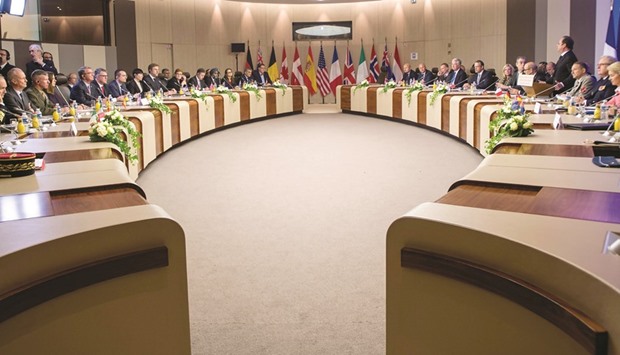Iraqi forces were inching to within striking distance of eastern Mosul yesterday as defence chiefs from the US-led coalition met in Paris to review the offensive on the militant bastion.
The United Nations said it had received reports of a new series of atrocities by the Islamic State group (IS) as troops close in on its last major urban stronghold in Iraq.
With the Mosul battle in its second week, French President Francois Hollande called for the coalition to prepare for the aftermath and the next stages of the campaign against the militants.
Forces from the elite counter-terrorism service (CTS) retook areas close to the eastern outskirts of Mosul.
“On our front, we have advanced to within 5 or 6km of Mosul,” their commander, General Abdelghani al-Assadi, said.
“We must now co-ordinate with forces on other fronts to launch a co-ordinated” attack on Mosul, he said, speaking from the Christian town of Bartalla.
Kurdish peshmerga forces are making gains on the northeastern front, but federal forces advancing from the south have some way to go before reaching the outskirts.
Meanwhile, thousands of men from the Hashed al-Shaabi paramilitary umbrella group dominated by Tehran-backed Shia militias were preparing for a push to the west of mainly Sunni Mosul.
The Hashed’s mission will be to “cut off and prevent the escape of (IS) towards Syria and fully isolate Mosul from Syria”, said Jawwad al-Tulaibawi, spokesman for the Asaib Ahl al-Haq militia.
“We expect that it will be a difficult and fierce battle,” he said.
Iraqi Kurds and Sunni Arab politicians have opposed the Hashed’s participation in the operation, as has Turkey, which has a military presence east of Mosul despite repeated demands by Baghdad to withdraw its forces.
Tensions have risen between Baghdad and Ankara, whose foreign minister, Mevlut Cavusoglu, warned yesterday that if there is a threat to Turkey, “we are ready to use all our resources including a ground operation”.
As Iraqi forces advance, the United Nations said it has received reports of dozens of execution-type killings by IS in Nineveh province, of which Mosul is the capital.
Citing preliminary reports, the UN said those killed included 50 police officers who had been held hostage.
In Paris, French Defence Minister Jean-Yves Le Drian was meeting coalition counterparts, including Pentagon chief Ashton Carter, to review the war on IS after more than two years of air strikes, training and on-the-ground military advisers.
Besides co-ordinating their support for the forces closing in on Mosul, ministers will also attempt to iron out differences over priorities in the campaign.
France is keen to tackle the militants’ Syria bastion Raqa, where a large number of French foreign fighters in IS ranks are stationed.
As the ministers met, Hollande warned that “the recapture is not an end in itself. We must already anticipate the consequences of the fall of Mosul.”
“What is at stake is the political future of the city, the region and Iraq,” Hollande said, calling for “all ethnic and religious groups” to have a say in the future running of Mosul.
He also called on the ministers to set out “the stages of the next operations” against IS, namely retaking Raqa.
While the militants in Mosul are outnumbered about 10 to one, there are insufficient forces available to take on the estimated 3,000-4,000 IS fighters in Raqa.
Seeking to draw attention away from the Mosul campaign, IS has staged attacks in the northern city of Kirkuk and western town of Rutba in recent days.
Militants seized two neighbourhoods in Rutba, but officials said that as of yesterday it was fully back in government hands.
Senior Iraqi and US military officials have reported that IS leaders are already trying to leave Mosul to reach the Syrian side of their “caliphate”.
But a senior official close to Le Drian said a few hundred IS fighters recently moved in the opposite direction, reinforcing the estimated 3,000 to 5,000 militants defending Mosul.
IS had shown increasing pragmatism in recent battles, tending to fall back in the face of superior firepower.
But with its claim to run a “caliphate” losing credibility with every new loss of territory, IS has mounted a fierce and well-organised resistance in the fight for Mosul.
The city is where IS supremo Abu Bakr al-Baghdadi proclaimed the cross-border “caliphate” in June 2014, and its loss could spell the end of the group’s days as a land-holding force in the Iraqi part.
In Moscow yesterday, Russian Foreign Minister Sergei Lavrov equated US support for Iraqi efforts to recapture Mosul with Russian backing of a Syrian government offensive to seize rebel-held east Aleppo.

An overall view of US Secretary of Defence Ashton Carter (fifth left) attending the Counter-ISIL Ministerial Meeting with ministers from 12 other countries in Paris yesterday. The US-led coalition is u201claying the groundworku201d for the u201cisolationu201d of Raqa, the Islamic State group stronghold in Syria, Carter said yesterday.
